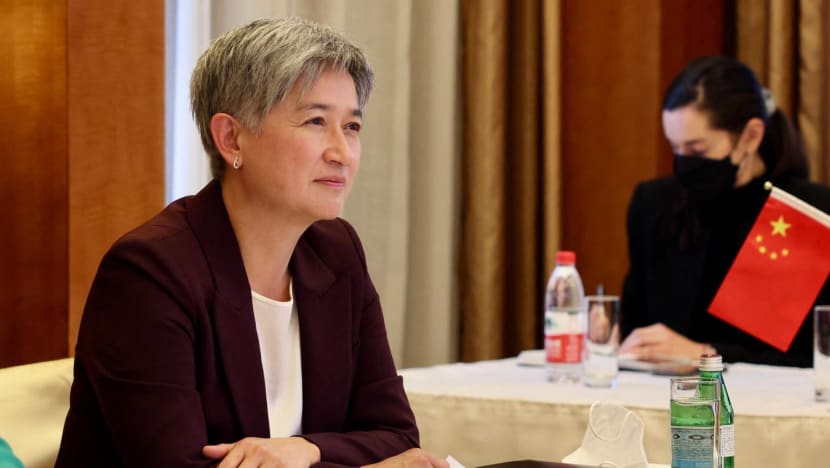Australian Foreign Minister Penny Wong’s visit to Beijing ignites hopes for warmer ties: Analysts

Australian Foreign Minister Penny Wong’s visit to China this week has ignited hopes for warmer relations and trade stability between the two countries, analysts said.
Ms Wong met China’s Foreign Minister Wang Yi on Wednesday (Dec 21), the first visit to Beijing by an Australian minister since diplomatic relations cooled in 2019.
Following their meeting, Ms Wong said there is a need for the major trading partners to manage their differences and grow their relationship.
“The success is that this dialogue is actually happening. This is an important, historic milestone,” said Professor James Curran from the University of Sydney. “More progress can be made from face-to-face dialogues.”
“The most significant thing is: We heard news of the Chinese customs department saying that Australian lobsters, as well as a number of other Australian products, are now welcomed in the Chinese market,” Prof Curran told CNA938’s Asia First.
Ahead of Ms Wong's meeting, Australian media outlets reported signs of a potential easing of trade sanctions imposed by Beijing on Australian goods, citing renewed interest from Chinese importers.
“So there’s movement (for diplomacy on both sides), and that is an absolutely critical step,” Prof Curran said.
CHINA-AUSTRALIA TENSIONS
China slapped sanctions and tariffs on Australian exports, including wine, barley, coal, and meat in 2020.
The trade tensions followed Canberra’s call for an independent investigation into the origins of the COVID-19 pandemic, which challenged Beijing’s narrative of the outbreak.
The trade dispute has cost Australia about US$13 billion, said Emeritus Professor of Politics Carlyle Thayer from the academic institution UNSW Canberra.
China is Australia’s biggest trading partner. Prior to the sanctions, about 90 per cent of Australia’s lobster exports and about 40 per cent of wine exports went to China.
Diplomatic relations were already frosty in 2018, after Australia barred China’s Huawei Technologies from its 5G broadband network.
Other thorny issues deteriorating relations were Australian accusations of Chinese cyberattacks to steal intellectual property, allegations of Chinese interference in Canberra’s domestic affairs, and the detention of two Australians in China on espionage charges.
LABOR KEEN ON CHINA TIES
Since Australia's Labor Party took power in May, it has been seeking to repair ties with China.
Compared with the previous government led by the Liberal Party, the current administration has “toned down on the rhetoric and improved the atmosphere for relations”, Prof Thayer told CNA’s Asia First.
“(Ms Wong’s visit is) another mark of how this relatively new Labour government has put an emphasis on diplomacy, in terms of managing its relationship with China,” Prof Curran said.
“It’s limited how much they can move, but unlike the previous government, they have stopped shouting at China. Of course, China’s wolf warrior diplomacy has also eased off significantly as well, so there’s movement on both sides,” he added.
Related:
When asked how Australia’s allies will perceive the warming ties, given the current climate of tension between the West and China, Prof Thayer replied: "They will endorse it completely, even the Biden administration."
He said that both Australia’s government and US President Joe Biden are keen to forge cooperation with China on a number of issues that Beijing is seen to be influential on.
These include the COVID-19 pandemic and other diseases, climate change, denuclearisation on the Korean peninsula, and pressuring Russia to end the war in Ukraine.
“These are areas any dialogue with China is seen as a move forward. Australia can now join the party and attempt to add that influence in these bilateral dialogues,” said Prof Thayer.
“So our allies, in my opinion, will applaud this because dialogue is essential,” he added.
POSITIVE OUTLOOK
Prof Thayer said he hopes Ms Wong’s trip to Bejing, which coincides with the 50th anniversary of diplomatic relations between the two countries, will kick start more of such meetings.
There are “great expectations” that after Ms Wong’s trip, Australian Prime Minister Anthony Albanese will follow suit and meet with Chinese President Xi Jinping, Prof Thayer said.
China is likely keen on improving relations with Australia as a diplomatic and trade partner, especially since China is trying to boost its economy following pandemic setbacks, he noted.
However, Prof Thayer said does not see the relationship advancing to pre-2018 levels, when ties were more intimate.
“There is common ground to advancing forward rather than holding in a negative position. (Both countries are) taking a long-term view and using this window of opportunity to tone down the rhetoric and some of the friction,” he said.












